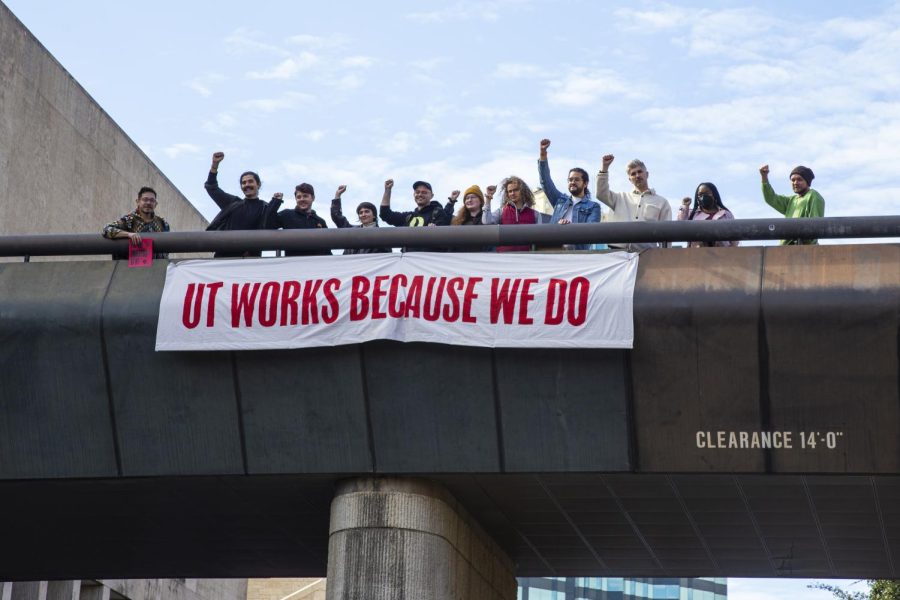Underpaid at UT takes labor action in front of PCL
November 18, 2022
Editor’s note: A previous version of this story said that unionizing is not an option in Texas, which is incorrect. That statement has been removed for accuracy. The Texan regrets this error.
Amid rising housing costs, changing health coverage and a stagnant salary for UT graduate workers, many graduate students say financial pressures have left them unable to support themselves, prompting a call for action.
Graduate student organization Underpaid at UT held a labor action protest Wednesday to inform the public about the conditions graduate students face. During the protest, students dropped a banner over the bridge that connects the College of Business Administration building to the Perry-Castañeda Library, reading “UT Works Because We Do.”
“There’s an inequity in pay across all departments at UT,” said Deepesh Verma, a member of Underpaid at UT. “The lowest pay we have found is $19,500 a year, with the highest being $38,000, so few students are making the living wage which is about $36,000.”
Even students earning the highest end of this income range are sometimes turned away from apartments due to income rules, said Lauren Nelson, a member of the organizing committee.
“We’ve given several surveys,” said Verma, a fourth-year Ph.D. student in the physics department. “All the surveys asked on a one-to-five metrics, ‘How stressed are you financially?’ No student indicated that they were not feeling some level of financial burden, and a majority reported a four or five.”
At the action, members handed out flyers from Speedway to the South Mall that read “You are Underpaid at UT” with a QR code that linked to their mission and goals. Due to safety concerns, the group had to remove the banner from the bridge, but they carried it around campus passing out the flyers afterwards.
“On top of pay, we have a lot of health care concerns,” said Nelson, a sixth-year Ph.D. student in the English department. “When our health care was changed last year, it caused a lot of unfortunate consequences. They decreased our coverage, and that’s part of why it’s so difficult to live and work here.”
With Texas being a right-to-work state, Nelson said Underpaid at UT plans to fight for higher pay without the use of traditional strikes.
On Dec. 13, they plan to hold a grade-in, a protest in which the workers will grade in public to demonstrate the amount of work they have, to pressure the deans of graduate schools to increase wages. Members are also considering organizing marches towards the Texas State Capitol in hopes of securing better funding at the next Texas Legislative session, Nelson said.
“We’re not working 20 hours a week –– we’re working way more than that to teach our students,” Verma said. “The thing that people like to say about graduate students is ‘Y’all aren’t actually working, y’all are only working 20 hours a week and getting paid well.’ Well, that’s not true, we’re working way more than that for these low, low wages. We are researchers and educators, we do so many essential jobs on campus that make UT what it is.”












